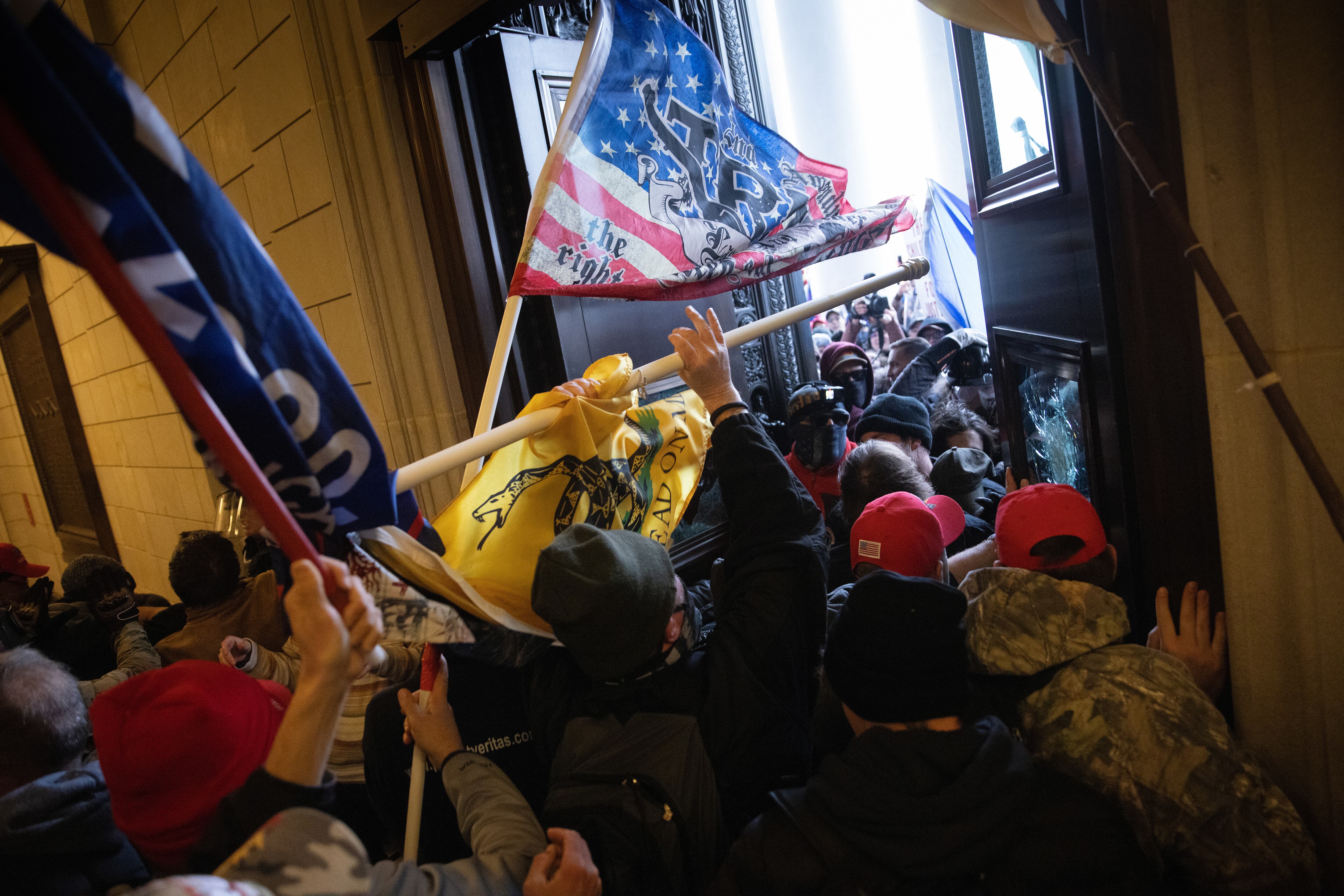WASHINGTON — In the days after a mob ransacked Capitol Hill on Jan. 6, 2021, some of the world’s largest defense firms announced they would pause and reevaluate their political donations.
For a brief moment, they followed through on their pledge. The blanket suspension of all political donations and associated reviews raised the possibility that the 147 Republicans who voted against certifying the presidential election results — lending credence to former President Donald Trump’s baseless allegations of mass voter fraud — would lose out on campaign donations. But by April 2021, the top five defense contractors resumed donations to both Democrats and the 147 Republicans who voted against election certification.
A Defense News analysis of Federal Election Commission data for the 2022 election cycle found that the five largest defense companies — Lockheed Martin, Raytheon Technologies, Boeing, Northrop Grumman and General Dynamics — contributed a total of nearly $2 million to Republicans who voted against certifying the 2020 presidential election results.
And with the election a week away, that number is likely to increase significantly once the Federal Election Commission posts additional contributions for September and October. Defense firms appear on track to max out their donations to key lawmakers who oversee hundreds of billions of dollars in programs, just as they have in prior election cycles. While these donations make up a small percentage of candidates’ war chests, they represent a return to pre-Jan. 6 thinking among the largest firms and an acceptance that such views are now simply part of navigating Washington.
RELATED
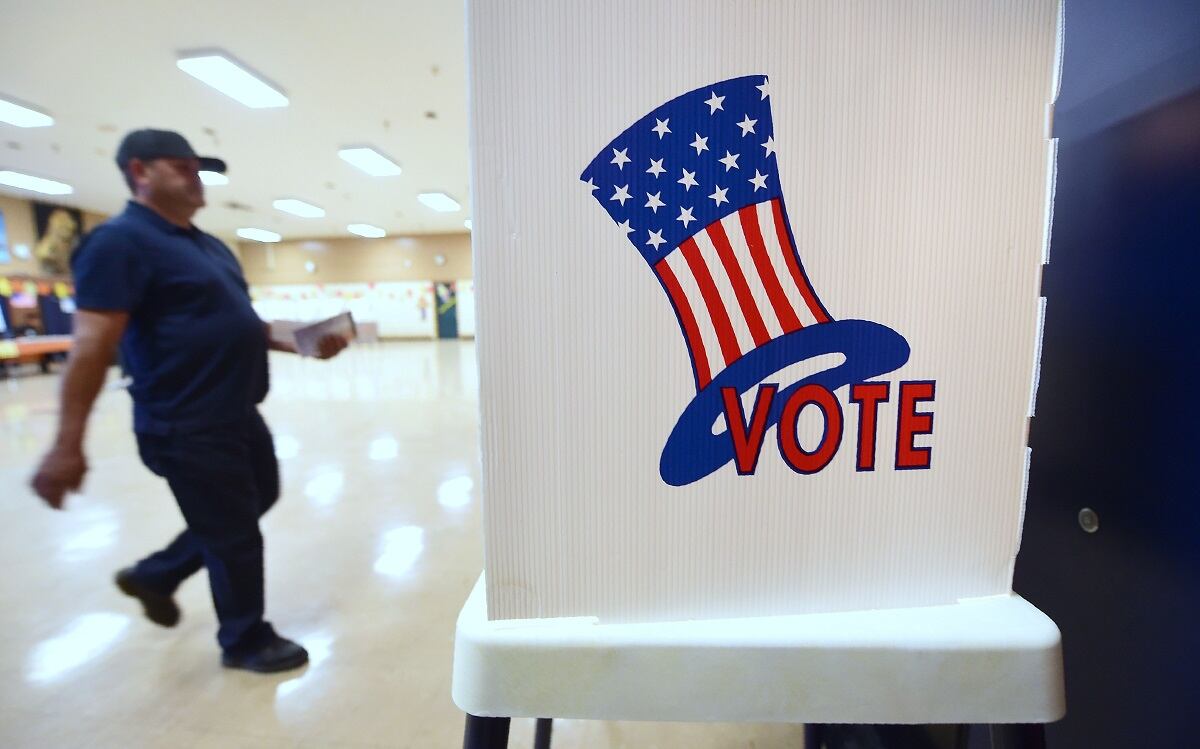
“This is business as usual,” said Sean McFate, an adjunct professor in national security at Syracuse University and a senior fellow at the Atlantic Council, a Washington-based think tank. “That one purchases influence is a time-tested way to generate business for a military-industrial company. It’s an open secret. It’s a form of corruption, essentially. It’s a well-known problem without a solution.”
Boeing said in a January 2021 statement it “strongly condemns the violence, lawlessness and destruction that took place in the U.S. Capitol on January 6, 2021″ as it joined multiple other major defense firms in announcing a short-lived pause and reevaluation of its political giving.
Boeing, which declined to comment for this piece, doled out at least $455,000 through August 2022 to 68 Republicans who voted against certifying the presidential election results — spending the most of the top five defense firms on donations to lawmakers who voted against certifying the 2020 election. It recorded $35.1 billion in defense revenue in 2021, making it the third-largest defense contractor, and has made nearly $5 million in campaign donations so far this election cycle.
The same day Boeing issued its statement condemning Jan. 6, House Minority Leader Kevin McCarthy, R-Calif., blamed Trump for the violence, after voting against certifying President Joe Biden’s election victory.
“The president bears responsibility for Wednesday’s attack on Congress by mob rioters,” McCarthy said on the House floor. “He should have immediately denounced the mob when he saw what was unfolding.”
Two weeks later, McCarthy reconciled with Trump during a Mar-a-Lago meeting. The minority leader, poised to become speaker of the House if Republicans take control, has in this year’s election cycle received at least $72,500 of his $33 million fundraising haul from the top five defense firms. That figure does not reflect his donations from the other major defense contractors, which typically max out their donations to influential lawmakers, or separate contributions from the companies’ executives and lobbyists.
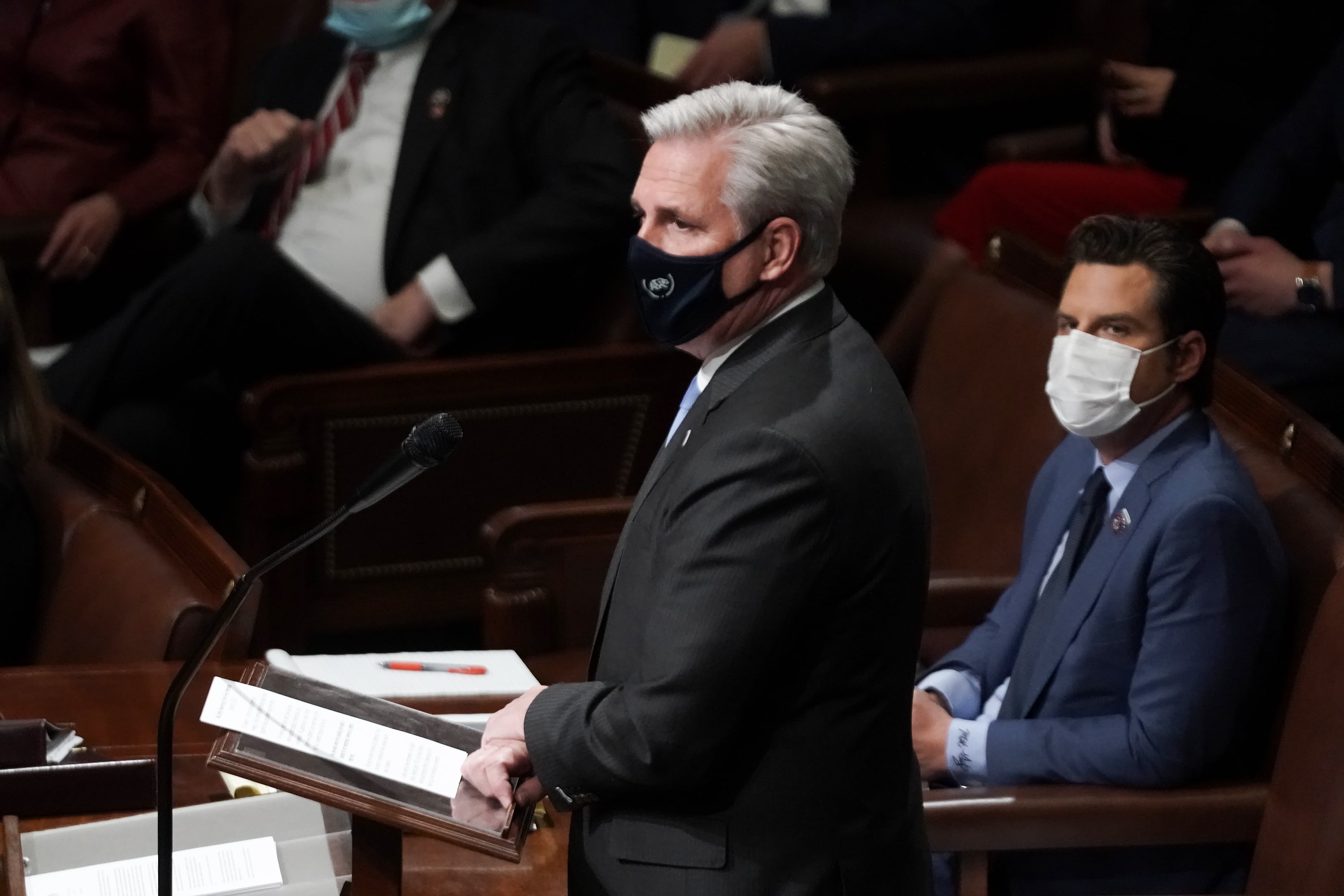
“Every cent that’s spent on military goods in the United States has to be authorized and appropriated by Congress,” said Loren Thompson, a defense industry consultant and the chief operating officer of the Lexington Institute, a Virginia-based think tank.
“These companies really don’t have a choice,” he added. “They have to be on good terms with their political customer.” (Thompson consults for Lockheed Martin, and the Lexington Institute takes contributions from several of the major defense firms, including General Dynamics.)
The House’s No. 2 and No. 3 Republicans — Steve Scalise of Louisiana and Elise Stefanik of New York — also voted against certifying Biden’s election victory and received contributions from the top five defense firms. Scalise took at least $57,500 from the top five, while Stefanik’s Political Action Committee received at least $22,500 in total from Lockheed Martin, Raytheon Technologies and Boeing.
RELATED

To ensure good terms across the aisle, the five largest defense companies have also donated this election cycle to Democratic leaders and lawmakers who voted to certify Biden’s victory. The top three House Democrats — Nancy Pelosi of California, Steny Hoyer of Maryland and Jim Clyburn of South Carolina — took in at least $50,000, $91,000 and $64,500 respectively in direct contributions and PAC donations from the top five defense contractors. Pelosi has raised $40.2 million total this election cycle, not counting $35.6 million from the Pelosi Victory Fund joint fundraising committee, while Hoyer has raised at least $9 million and Clyburn at least $4.7 million.
“The problem with federal contractors donating generally is the sense that it’s a pay-to-play system,” said Saurav Ghosh, the campaign finance reform director at the watchdog group Campaign Legal Center.
A long memory
It is illegal for federal contractors to donate to politicians’ PACs. But large businesses, including Lockheed Martin and the other top defense firms, can form their own employee PACs. The employee PACs can then contribute to lawmakers and their respective leadership PACs.
The company covers the cost of administering the PAC and cannot compel its employees to donate, but the firm determines which lawmakers receive the donations — and how much — from the employee PAC.
After Jan. 6, Lockheed Martin, which reported nearly $64.5 billion in 2021 defense revenue as the largest contractor, said it would evaluate its donations to “reflect our core values and the constantly changing political landscape and priorities” while ensuring “our political donation and engagement program remains aligned with our business priorities.”
In the most recent cycle, Lockheed narrowly trailed Boeing in donations to election-denying candidates. Indeed, the 2022 and 2021 FEC filings reveal Lockheed Martin has not significantly changed its donation patterns from prior election cycles.
The largest defense contractor donated at least $450,500 through August 2022 to 91 Republicans who voted against certifying the presidential election results. It has spent at least $3.2 million in total campaign donations so far this election cycle.
“Our employee PAC program continues to observe long-standing principles of non-partisan political engagement in support of our business interests,” the company told Defense News in a statement.
Of the 147 Republicans who voted against the election, Rep. Mike Rogers of Alabama — the top Republican on the House Armed Services Committee — received the most from the top five firms with a combined total of at least $89,500 so far this election cycle. Rogers has raised at least $2.5 million total this cycle.
Rogers’ donations from the top five firms are nearly double that of his counterpart, House Armed Services Chairman Adam Smith, D-Wash.
Smith — who voted to certify the 2020 election — received $45,000 in direct donations from the top five firms, but zero leadership PAC donations. By comparison, Rogers’s leadership PAC — National Security PAC — took in at least $40,000 from the top five firms, on top of his $49,500 in direct donations, for a total of $89,500.
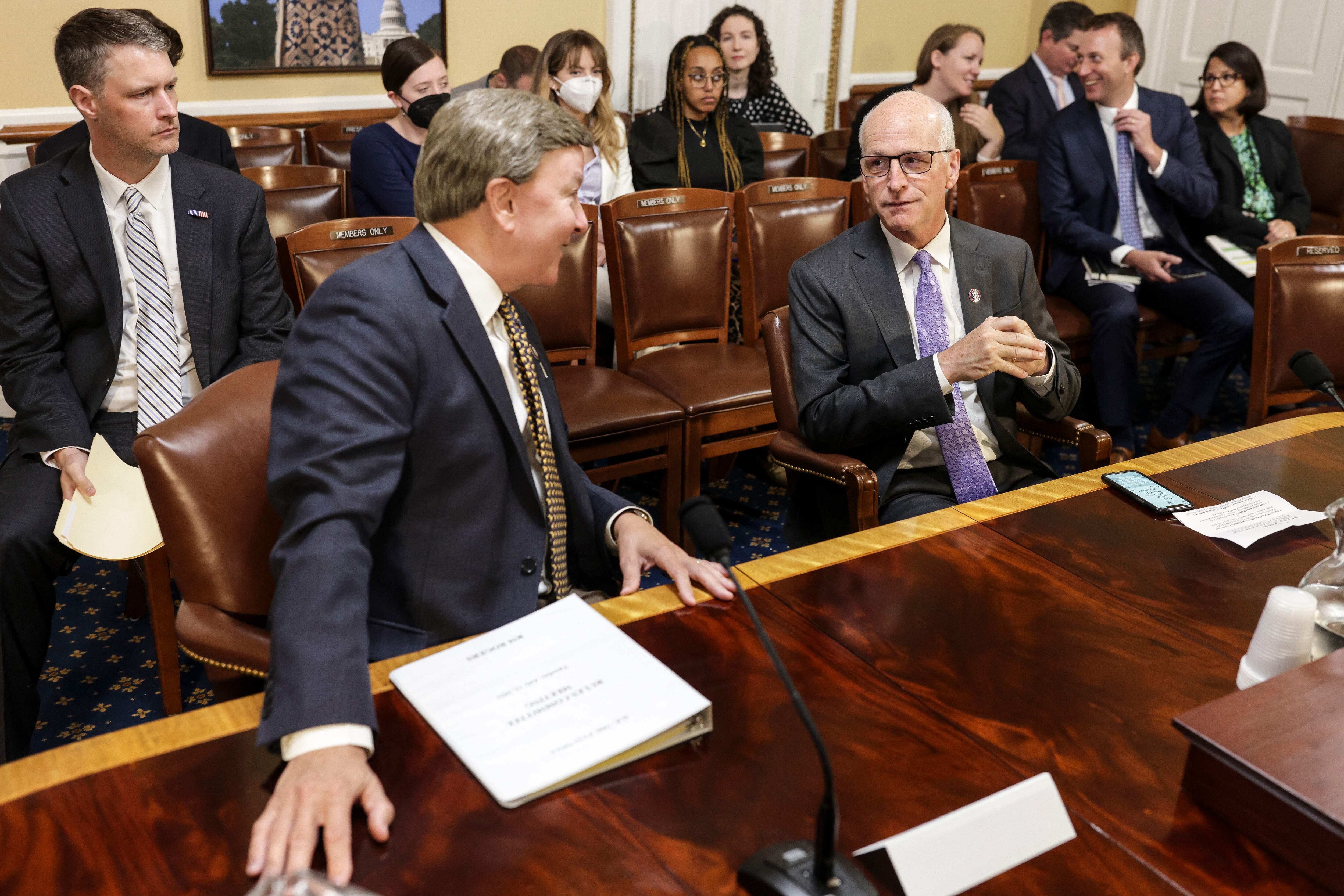
Leadership PACs allow lawmakers to curry favor with other politicians by using them to donate to allies’ campaigns. This is essential for lawmakers who wish to ascend to the ranks of leadership or receive favorable committee assignments. The loose regulations around these PACs also allow lawmakers to use the funds to cover other expenses, such as dinners and hotel stays.
“The whole idea that the system doesn’t work for everyday people is based on this kind of transactional set-up where your Boeing and your Northrop Grumman are giving generously to somebody who is sitting on an important subcommittee,” said Ghosh. “And when the time comes they find their calls being answered — doors being opened for them and their lobbyists — and not necessarily in the same way as their constituents.”
These contributions can make it easier to secure access and meetings with lawmakers and their staff — a potent influence tool when coupled with high-powered lobbyists working on a company’s behalf.
“All of these offices are going to have a long memory, and are going to remember who stopped contributing and who didn’t,” a defense lobbyist said on condition of anonymity to speak freely. “Public perception demanded an immediate pause in the aftermath of January 6, but as the memory of that faded, contributions resumed and it’s very easy to be fully maxed out over the end of the cycle.”
General Dynamics — the fifth-largest firm with $30.8 billion in 2021 defense revenue — declined to comment directly on the donations, but referred Defense News to a new provision in its 2021 sustainability report. That provision notes its “employee PAC will not support members of Congress who provoke or incite violence or similar unlawful conduct.”
The company did not issue a statement regarding Jan. 6, but nonetheless paused its political donations through April 2021. General Dynamics donated at least $403,500 through September 2022 to 66 election-denying lawmakers. It has recorded at least $2.5 million in campaign donations so far this election cycle.
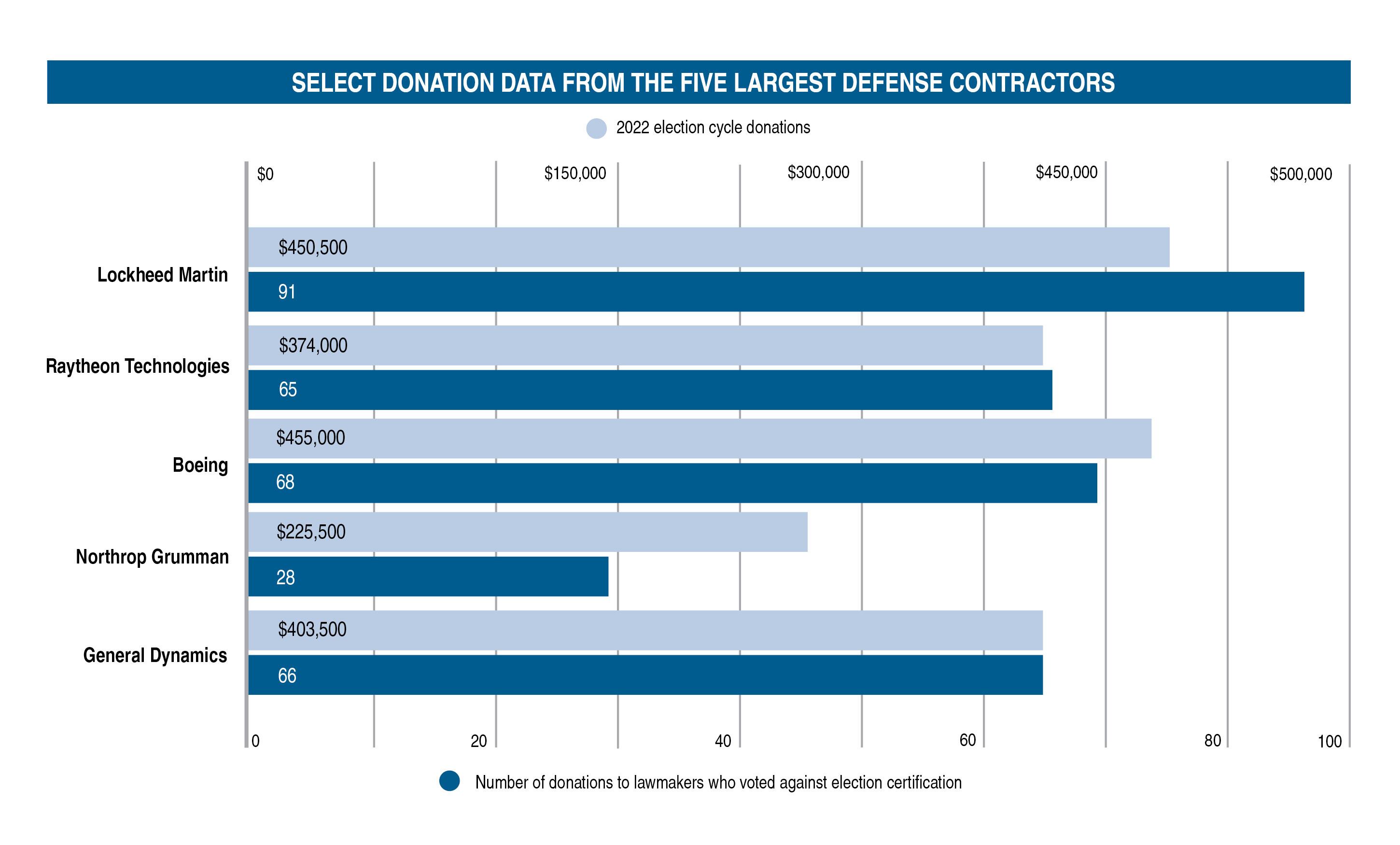
And Raytheon Technologies — the second-largest firm with $41.9 billion in 2021 defense revenues — contributed at least $374,000 in donations through August 2022 to 65 Republicans who voted against certifying the presidential election.
After Jan. 6, company spokesman Chris Johnson said the contractor had paused contributions to “reflect on the current environment,” but he declined to comment on its subsequent donations. Raytheon has made at least $2.6 million in campaign donations so far this election cycle.
Thompson argued the donations are essential to ensuring Congress takes national security seriously.
“If contractors were not able to contribute to political campaigns, it’s doubtful that there would be strong bipartisan support for the nation’s defense posture,” said Thompson. “The name of the game on Capitol Hill is getting reelected. And if contractors can’t participate in that process, then chances are lawmakers will not care much about their interests.”
Northrop Grumman — the fourth-largest firm with $31.4 billion in 2021 defense revenue — has donated at least $225,500 through August 2022 to 28 lawmakers who voted against certifying the presidential election, the least of the top five contractors so far. The company did not respond to Defense News’ requests for comment; it has made at least $2.4 million in campaign donations so far this election cycle.
The donation patterns from the five top companies overwhelmingly favor lawmakers who sit on the Armed Services and defense appropriations committees. Six Republicans who voted against the election and lead their party on relevant defense committees and panels, including Rogers, continued to receive more money from the major defense contractors than the other lawmakers who voted against election certification.
That includes Rep. Ken Calvert, R-Calif., the ranking member of the defense appropriations subcommittee, who received at least $70,000 from the five firms so far this election cycle. Calvert has raised $3.8 million so far this cycle in a fairly competitive race.
Whether it’s Calvert or another lawmaker leading Republicans on the defense spending panel next year, they will likely be able to collect similar levels of campaign contributions from the industry — regardless of whether they recognize the legitimacy of U.S. elections. Meanwhile, China and Russia continue to fan the flames of American cultural divisions, including over the very legitimacy of U.S. elections.
McFate noted foreign adversaries seek to breed “hyper partisanship,” in part by highlighting corruption in Washington — real or perceived.
“If you want to win against the United States, you have to rupture it from within,” he said.
Bryant Harris is the Congress reporter for Defense News. He has covered U.S. foreign policy, national security, international affairs and politics in Washington since 2014. He has also written for Foreign Policy, Al-Monitor, Al Jazeera English and IPS News.
Chris Martin is the managing editor for Defense News. His interests include Sino-U.S. affairs, cybersecurity, foreign policy and his yorkie Willow.
